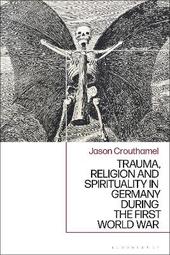
|
Trauma, Religion and Spirituality in Germany during the First World War
Hardback
Main Details
| Title |
Trauma, Religion and Spirituality in Germany during the First World War
|
| Authors and Contributors |
By (author) Prof. Jason Crouthamel
|
| Physical Properties |
| Format:Hardback | | Pages:272 | | Dimensions(mm): Height 234,Width 156 |
|
| Category/Genre | First world war
History of religion |
|---|
| ISBN/Barcode |
9781350083707
|
| Classifications | Dewey:940.31 |
|---|
| Audience | | Tertiary Education (US: College) | | Professional & Vocational | |
|---|
| Illustrations |
14 bw illus
|
|
Publishing Details |
| Publisher |
Bloomsbury Publishing PLC
|
| Imprint |
Bloomsbury Academic
|
| Publication Date |
18 November 2021 |
| Publication Country |
United Kingdom
|
Description
This book explores the impact of violence on the religious beliefs of front soldiers and civilians in Germany during the First World War. The central argument is that religion was the main prism through which men and women in the Great War articulated and processed trauma. Inspired by trauma studies, the history of emotions, and the social and cultural history of religion, this book moves away from the history of clerical authorities and institutions at war and instead focuses on the history of religion and war 'from below.' Jason Crouthamel provides a fascinating exploration into the language and belief systems used by ordinary people to explain the inexplicable. From Judeo-Christian traditions to popular beliefs and 'superstitions,' German soldiers and civilians depended on a malleable psychological toolbox that included a hybrid of ideas stitched together using prewar concepts mixed with images or experiences derived from the surreal environment of modern combat. Perhaps most interestingly, studying the front experience exposes not only lived religion, but also how religious beliefs are invented. Front soldiers in particular constructed new, subjective spiritual and religious concepts based on encounters with industrialized weapons, the sacred experience of comradeship, and immersion in mass death, which profoundly altered their sense of self and the supernatural. More than just a coping mechanism, religious language and beliefs enabled victims, and perpetrators, of violence to narrate concepts of psychological renewal and rebirth. In the wake of defeat and revolution, religious concepts shaped by the war experience also became a cornerstone of visions for radical political movements, including the National Socialists, to transform a shattered and embittered German nation. Making use of letters between soldiers and civilians, diaries, memoirs and front newspapers, Trauma, Religion and Spirituality in Germany during the First World War offers a unique glimpse into the belief systems of men and women at a turning point in European history.
Author Biography
Jason Crouthamel is Professor of History at Grand Valley State University, USA. He is the author of An Intimate History of the Front: Masculinity, Sexuality and Ordinary German Soldiers in the First World War (2014) and The Great War and German Memory: Society, Politics and Psychological Trauma (2009). He has also co-edited, along with Peter Leese, Psychological Trauma and the Legacy of the First World War (2016) and Traumatic Memories of the Second World War and After (2016). He recently co-edited, with Julia B. Koehne and Peter Leese, Languages of Trauma: History, Memory and Media (2021).
ReviewsTrauma, Religion and Spirituality in Germany during the First World War is an organized and methodical study ... This is a book with much to recommend to scholars teaching about the First World War, to researchers of the conflict, and of modern European religion more generally. * H-Soz-Kult * [A] deeply humanistic explanation of the effects of wartime trauma on the religious and spiritual lives of German soldiers ... Through intimate portrayals of soldiers' minds and souls, Crouthamel invites readers to join in a core practice of historical study, empathy ... Crouthamel demonstrates with skill the profound and everlasting resilience of humanity in the face of trauma and the consequential historical impact of moral injuries inflicted by war. * George L. Mosse Program in History, University of Wisconsin-Madison * How did "ordinary" soldiers cope with the bloody traumas of the First World War? Jason Crouthamel shows how they sought meaning from religion and spirituality. He encourages readers to think about the hopes of German soldiers as they encountered unimaginable terror. This is a book to transform the way we think about human resilience and despair. * Joanna Bourke, Professor of History, Birkbeck, University of London, UK * Crouthamel's fine study shows how religious life in Germany between 1914 and 1918 was a rich amalgam of beliefs, hope and fantasy braided together by ordinary people to help them survive the unbearable strain of living through the Great War. The state did not create this efflorescence of religious practices and images. They emerged from within a society pushed to the limits of emotional endurance and beyond. * Jay Winter, Charles J. Stille Professor of History Emeritus, Yale University, USA * Crouthamel has constructed a rich history of religion and religiosity during the First World War, not only 'from above', but also and especially 'from below'. His book carefully demonstrates the complex and diverse nature of the experience of this war on German soldiers. Crouthamel shows how both religion and alternative systems of belief were utilised by German soldiers at the front. His book displays both great breadth and depth in its coverage, using memoirs, diaries and letters extremely effectively to offer an important perspective on the experiential trauma of the First World War * Lisa Pine, Author of Hitler's 'National Community': Society and Culture in Nazi Germany *
|